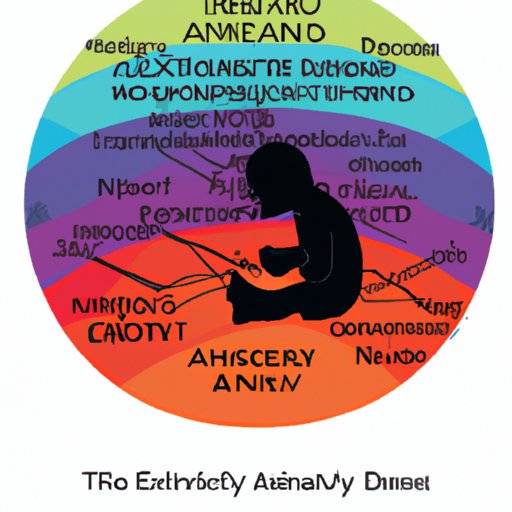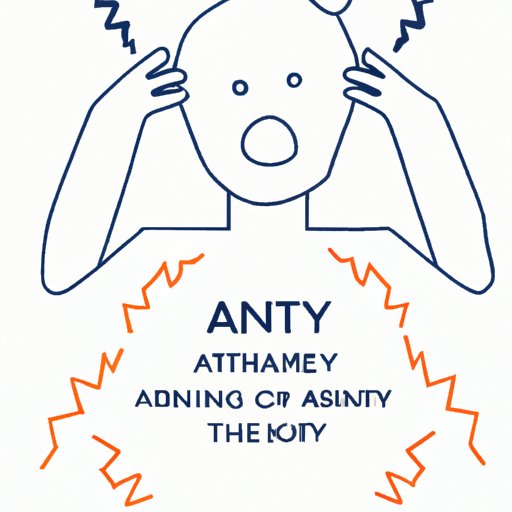Introduction
Anxiety is one of the most common mental health disorders, affecting approximately 40 million adults in the United States alone. It is characterized by feelings of fear, worry, and unease that can interfere with daily functioning. While there are many effective treatments for anxiety, it is important to understand what causes a person to develop anxiety in the first place.
In this article, we will explore the biological, stressful, genetic, and experiential factors that can contribute to the development of an anxiety disorder. We will look at how neurochemistry, hormones, stress, family history, childhood experiences, and trauma can all play a role in the onset of anxiety.

Exploring the Biological Basis of Anxiety
There is increasing evidence that anxiety disorders have a biological basis. Neurochemicals such as serotonin, dopamine, and norepinephrine have been linked to anxiety, and certain brain structures, such as the amygdala, have also been implicated in the development of anxiety. Additionally, hormones such as cortisol and adrenaline can influence the body’s response to stress, which can in turn increase anxiety levels.
The neurotransmitters serotonin and dopamine are known to play a role in regulating mood, and deficits in these chemicals have been linked to depression and anxiety. The amygdala, a structure located deep within the brain, is responsible for processing emotions, and research has shown that individuals with anxiety disorders often have an overactive amygdala. Finally, hormones such as cortisol and adrenaline are released in response to stress, and long-term exposure to these hormones can lead to increased levels of anxiety.
Examining the Role of Stress in the Development of Anxiety Disorders
Stress is a normal part of life, and everyone experiences it to some degree. However, when stress becomes chronic or overwhelming, it can have a significant impact on physical and mental health. Physiologically, stress triggers the release of hormones such as cortisol and adrenaline, which can lead to an increased heart rate, elevated blood pressure, and difficulty sleeping. In addition, chronic stress can also lead to changes in brain chemistry, which can further exacerbate anxiety symptoms.
The long-term effects of chronic stress can be particularly damaging. Research has shown that prolonged periods of stress can lead to increased levels of anxiety, depression, and other mental health issues. Furthermore, chronic stress has been linked to a number of physical health problems, such as cardiovascular disease, obesity, and diabetes.
Investigating the Genetic Predisposition to Anxiety Disorders
Research has shown that genetics can play a role in the development of anxiety disorders. Studies have found that individuals with a family history of anxiety disorders are more likely to develop an anxiety disorder themselves. This suggests that there may be a genetic component to anxiety disorders, although the exact mechanism is not yet fully understood.
While genetics certainly plays a role in the development of anxiety disorders, it is important to note that environmental factors can also be influential. For example, individuals who grow up in highly stressful environments may be predisposed to developing anxiety disorders due to their family history, but the environment can further exacerbate the condition.

Uncovering the Impact of Early Life Experiences on Anxiety Disorders
Early life experiences can also have a profound impact on the development of anxiety disorders. Adverse childhood experiences, such as physical or emotional abuse, neglect, or the loss of a parent, can lead to long-term psychological distress. These experiences can affect the way an individual responds to stress, leading to increased levels of anxiety.
Additionally, early life experiences can also shape the way an individual copes with stress. People who grow up in stressful environments may develop maladaptive coping mechanisms, such as avoidance or self-medication, which can further exacerbate anxiety levels.

Assessing the Role of Trauma in the Onset of Anxiety Disorders
Traumatic events, such as natural disasters, accidents, or violent attacks, can have a significant impact on mental health. Trauma can lead to a range of physical and psychological symptoms, including flashbacks, nightmares, and increased levels of anxiety. In some cases, trauma can even trigger the onset of an anxiety disorder.
It is important to note that not all people who experience trauma will develop an anxiety disorder. However, those who do are at an increased risk of developing a more severe form of anxiety, such as post-traumatic stress disorder (PTSD). Treatment for PTSD typically involves a combination of psychotherapy and medication.
Conclusion
Anxiety is a complex condition, and there are many factors that can contribute to its development. We have explored the biological, stressful, genetic, and experiential factors that can lead to the onset of an anxiety disorder. Neurochemistry, hormones, stress, family history, childhood experiences, and trauma can all play a role in the development of anxiety.
It is important to remember that while these factors can increase the risk of developing an anxiety disorder, they do not necessarily mean that someone will develop an anxiety disorder. With proper treatment and support, it is possible to manage anxiety and lead a healthy and fulfilling life.
If you or someone you know is struggling with anxiety, there are resources available to help. Your doctor can provide information about treatment options, and organizations such as the National Alliance on Mental Illness (NAMI) offer support and education.
(Note: Is this article not meeting your expectations? Do you have knowledge or insights to share? Unlock new opportunities and expand your reach by joining our authors team. Click Registration to join us and share your expertise with our readers.)
